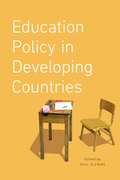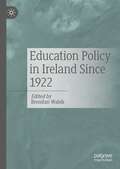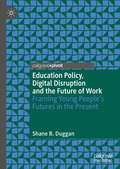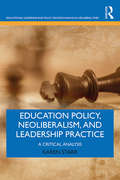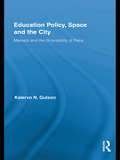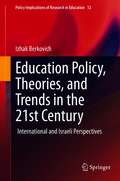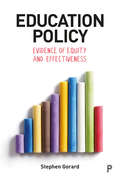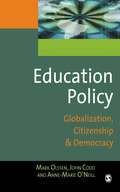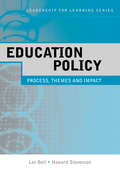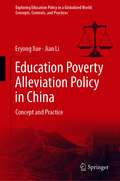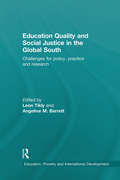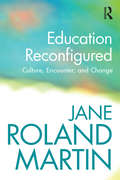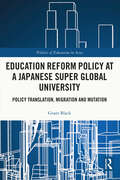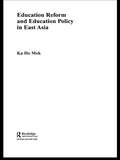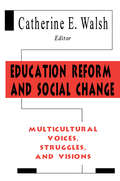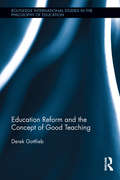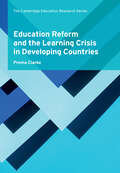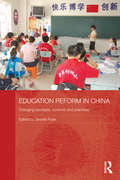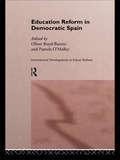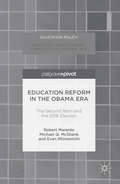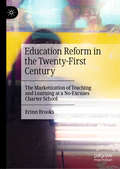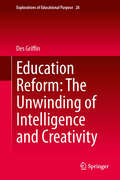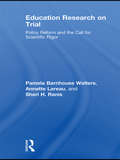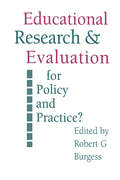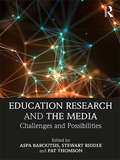- Table View
- List View
Education Policy in Developing Countries
by Paul GlewweAlmost any economist will agree that education plays a key role in determining a country’s economic growth and standard of living, but what we know about education policy in developing countries is remarkably incomplete and scattered over decades and across publications. Education Policy in Developing Countries rights this wrong, taking stock of twenty years of research to assess what we actually know—and what we still need to learn—about effective education policy in the places that need it the most. Surveying many aspects of education—from administrative structures to the availability of health care to parent and student incentives—the contributors synthesize an impressive diversity of data, paying special attention to the gross imbalances in educational achievement that still exist between developed and developing countries. They draw out clear implications for governmental policy at a variety of levels, conscious of economic realities such as budget constraints, and point to crucial areas where future research is needed. Offering a wealth of insights into one of the best investments a nation can make, Education Policy in Developing Countries is an essential contribution to this most urgent field.
Education Policy in Ireland Since 1922
by Brendan WalshThis book examines educational policy at primary, secondary and university level in Ireland from the foundation of the State to the present day. Primarily an attempt to set policy within a historical context, the book draws together compelling research on the evolution of key changes in topics as diverse as the use of corporal punishment, the evolution of skills policy in post-primary settings and the development of the universities in the post-1922 period. The book includes detailed analysis of more recent policy initiatives and changes in, initial teacher education, curriculum change, and special and inclusive education and will be of interest to those working in the various fields, students and the general public. It presents detailed discussions of change in the Irish education system, demonstrating how policy initiatives, particularly since the early 1990s, have brought about significant transformation at all levels. In doing so, the book also demonstrates that the origin of change often lay in earlier developments, particularly those of the mid-1960s. Policy development is closely linked to external factors and influences and chapters on academic selection and teachers’ recollections of policy, for example, set developments within the wider historical context employing the views and recollections of teachers so that the influence of change on day-to-day practice is revealed.
Education Policy, Digital Disruption and the Future of Work: Framing Young People’s Futures in the Present
by Shane B. DugganThis book examines the possibilities, practices and consequences of digital disruption and networked economies in education policy. As traditional notions of learning and labour are abstracted by networked technologies, young people are exposed to new forms of governance and intervention. Tracing key education policy shifts from the turn of the millennium to the present day, this book explores notions of value, aspiration, and equity in the context of the rise of the networked economies and the ‘end of work’. It argues that a policy focus on preparing young people for the future – a future that will be dominated by networked technologies – informs both what counts as ‘success', and reorganises young people’s orientation in the present in new commodified forms. In an era where the costs of higher education are rapidly increasing despite their relative decline in value, this book will resonate with scholars in youth and educational studies, as well as those with an interest in emerging forms of labour and work.
Education Policy, Neoliberalism, and Leadership Practice: A Critical Analysis (Educational Leadership and Policy Decision-Making in Neoliberal Times)
by Karen StarrEducation Policy, Neoliberalism, and Leadership Practice is a foundational book describing all aspects of neoliberalism and its broad scale impact in education. Drawing on research and canvassing policy developments across a range of contexts, this book critically analyzes neoliberal education policies, the practices and outcomes they spawn, and the purposes they serve. It interrogates how education leaders perceive and interpret neoliberal influences and the dilemmas and opportunities they create, while unpacking questions of why neoliberalism is the basis for educational policy, how neoliberalism impacts on education, and what this means for the future.
Education Policy, Space and the City: Markets and the (In)visibility of Race (Routledge Research in Education)
by Kalervo N. GulsonDrawing on three case studies of K-12 public schooling in London, Sydney and Vancouver, this book examines the geographies of neoliberal education policy in the inner city. Gulson uses an innovative and critical spatial approach to explore how the processes and practices of neoliberal education policy, specifically those relating to education markets and school choice, enable the pervasiveness of a white, middle-class, re-imagining of inner-city areas, and render race "(in)visible." With urbanization posited as one of the central concerns for the future of the planet, relationships between the city, educational policy, and social and educational inequality deserve sustained examination. Gulson’s book is a rich and needed contribution to these areas of study.
Education Policy, Theories, and Trends in the 21st Century: International and Israeli Perspectives (Policy Implications of Research in Education #12)
by Izhak BerkovichThis book provides a highly accessible overview of public education policy. It organizes knowledge about 21st century education policy around two main topics: the policy process, and the discourse on public education policy. This unique organization provides a novel lens for better understanding the dynamics and contents of current education policy making. The work also offers a broad overview of theories of public policy, economics, demography, sociology, history, and psychology. Each chapter includes a discussion of data derived from the international and Israeli contexts. The book provides a series of valuable insights relevant to researchers, practitioners, and policymakers interested in understanding the multifaceted aspects that shape contemporary education policy.
Education Policy: Evidence of Equity and Effectiveness
by Stephen GorardWhat has been done to achieve fairer and more efficient education systems, and what more can be done in the future? Stephen Gorard provides a comprehensive examination of crucial policy areas for education, such as differential outcomes, the poverty gradient, and the allocation of resources to education, to identify likely causes of educational disadvantage among students and lifelong learners. This analysis is supported by 20 years of extensive research, based in the home countries of the UK and on work in all EU28 countries, USA, Pakistan and Japan. This approachable, rich text brings invaluable insights into the underlying problems within education policy, and proposes practical solutions for a brighter future.
Education Policy: Globalization, Citizenship and Democracy
by Anne-Marie O'Neill Assoc Prof John A Codd Dr Mark Olssen`Education policy is now a global matter and all the more complex for that. Mark Olssen, John Codd and Ann-Marie O'Neill do us an invaluable service in producing a carefully theorised guide to current issues and key concerns - this is an important, erudite and very practical book' - Stephen J Ball, Education Policy Research Unit, University of London `Given the global reach of neoliberal policies, we need cogent books that enable us to better understand the major effects such tendencies have. Education Policy is such a book. It is insightful and well written--and should be read by all of us who care deeply about what is happening in education in international contexts' - Michael W Apple, Author of 'Educating the "Right" Way and John Bascom Professor of Education University of Wisconsin, Madison `I really am taken with the book, the range and depth of analysis are truly impressive. This book is a magnum opus and everyone in the area should read it'- Hugh Lauder, University of Bath `In their insightful and comprehensive book on education policy Mark Olssen, John Codd and Anne-Marie O'Neill wrestle with the big questions of citizenship and democracy in an age of globalization. They argue that ducation policy in the 21st century is the key to security, sustainability and survival. The book, anchored in the poststructuralist perspective of Michel Foucault, traverses the whole territory of education policy not only methods and approaches of policy analysis and the dominant political perspectives that influence policy-classical liberalism, social democracy and neo-liberalism--but also those policy areas that require the closest scrutiny: markets, trust, professionalism, choice, diversity, and finally, community, citizenship and democracy. This is the new policy bible for educationalists - it is at once systematic, provocative and instructive' - Michael A Peters, Research Professor, University of Glasgow 'It is rare indeed for books with such ambitious scope as this one to appear within educational scholarship... This is an important book for any graduate student who is undertaking work on any aspect of education policy' - Education Review This book provides an international perspective on education policy, and of the role and function of education in the global economy. The authors present a Foucauldian perspective on the politics of liberal education, within a theoretical framework necessary for the critical analysis of education policy. The authors set out the analyses necessary for understanding the restructuring in education and social policy that has occurred in many countries affected by the resurgence of neo-liberal political theory. They examine education policy in relation to globalization, citizenship and democracy. The authors argue that globalization is an extension of neoliberalism and is destructive of the nation state, community and democracy. They show the importance of education in building strong democratic nation states and global communities based on cultural identity and inter-cultural awareness. This book is essential reading for students of education policy studies and social policy analysis.
Education Policy: Process, Themes and Impact (Leadership for Learning Series)
by Howard Stevenson Les BellThe study of educational leadership makes little sense unless it is in relation to who the leaders are, how they are leading, what is being led, and with what effect. Based on the premise that learning is at the heart of leadership and that leaders themselves should be learners, the Leadership for Learning series explores the connections between educational leadership, policy, curriculum, human resources and accountability. Each book in the series approaches its subject matter through a three-fold structure of process, themes and impact. Series Editors - Clive Dimmock, Mark Brundrett and Les Bell As global pressures focus increasing attention on the outcomes of education policy and on their implications for economic prosperity and social citizenship, the experience of each individual learner is decisively shaped by the wider policy environment. However, there is often an underdeveloped understanding of how education policy is formed, what drives it and how it impacts on schools and colleges. This book explicitly makes these connections and links them to the wider challenges of educational leadership in a modern context. Education Policy is divided into three sections, which examine: the development of policy at the levels of the nation state and individual institutions the forces that shape policies with emphasis on human capital theory, citizenship and social justice and accountability research-based case studies highlighting the application of policy in a range of situations. The book provides a valuable resource for students, practitioners, middle managers and educational leaders in all sectors, both in the UK and internationally, who are engaged on masters and doctoral degrees, or undertaking leadership training and preparation programmes.
Education Poverty Alleviation Policy in China: Concept and Practice (Exploring Education Policy in a Globalized World: Concepts, Contexts, and Practices)
by Jian Li Eryong XueThis book explores the education poverty alleviation policy in China from the perspectives of concept and practice. In this book, the authors also examine the major national education poverty alleviation policy to analyze the different periods and stages of education in China. This book also explores the development of China’s education poverty alleviation policy from different scopes. It examines the various stages, features, problems and suggestions in Chinese poverty alleviation progress.The intended readers are scholars and researchers who are interested and work in research of the poverty alleviation education in Chinese context, and also the administrators and stakeholders in Chinese poverty alleviation education management and graduate students who majoring and minoring in the field of anti-poverty education.
Education Quality and Social Justice in the Global South: Challenges for policy, practice and research (Education, Poverty and International Development)
by Edited by Leon Tikly Angeline M. BarrettHow we understand education quality is inextricably linked with perspectives on social justice. Questions of inclusion, relevance and democracy in education are increasingly contested, most especially in the global South, and improving the quality of education, particularly for the most disadvantaged, has become a topic of fundamental concern for education policy makers, practitioners and the international development community. The reality experienced by many learners continues to be of inadequately prepared and poorly motivated teachers, struggling to deliver a rapidly changing curriculum without sufficient support, and often using outmoded teaching methods in over-crowded or dilapidated classrooms. Education Quality and Social Justice in the South includes contributions from leading scholars in the field of education and development. The text draws upon state of the art evidence from the five year EdQual research programme, which focuses upon raising achievement in low income countries, and demonstrates how systems of high quality universal education can be sustained. By exploring recent research initiatives to improve education quality, the importance of supporting local policy makers, educators and parents as agents of change, and students as active inquirers is highlighted, and the challenge of taking successful initiatives to scale is explained. The book is divided into three main parts: -Framing Education Quality -Planning and Policies for Quality -Implementing Quality in Schools Education Quality and Social Justice in the South argues that implementing a high quality of education using theories of social justice can inform the understanding of inclusion, relevance and democracy in education. The book should be essential reading for both students and researchers within the fields of international and comparative education, along with educational policy, poverty and development studies.
Education Reconfigured: Culture, Encounter, and Change
by Jane Roland MartinAs philosophers throughout the ages have asked: What is justice? What is truth? What is art? What is law? In Education Reconfigured, the internationally acclaimed philosopher of education, Jane Roland Martin, now asks: What is education? In answer, she puts forward a unified theory that casts education in a brand new light. Martin’s "theory of education as encounter" places culture alongside the individual at the heart of the educational process, thus responding to the call John Dewey made over a century ago for an enlarged outlook on education. Look through her theory’s lens and you can see that education takes place not only in school but at home, on the street, in the mall—everywhere and all the time. Look through that lens and you can see that education does not always spell improvement; rather, it can be for the better or the worse. Indeed, you can see that education is inevitably a maker and shaper of both individuals and cultures. Above all, Martin’s new educational paradigm reveals that education is too important to be left solely to the professionals; that it is one of the great forces in human society and, as such, deserves the attention and demands the vigilance of every thoughtful person.
Education Reform Policy at a Japanese Super Global University: Policy Translation, Migration and Mutation (Politics of Education in Asia)
by Grant BlackThis book is a case study of policy translation at an elite Japanese university. Through an analysis of the implementation of government-funded reform policies, Black investigates the role of the university in society, the youth-to-work transition, and systems of organisational management operative at the university. Black was present throughout the initial adoption phase of the Super Global project, a policy project implemented at an elite Japanese university, the University of Tsukuba. Aligned with a basic critical realist perspective, the different components of his research are integrated in four levels of analysis: the macro level of policy, the organisation level of the university, the departmental level of the English Section, and the individual level of the student. The analysis and the different sources of data look at internal structures of the organisation and try to understand what the mechanisms of policy translation operative are in the integrated and overlapping complexity of the four levels of analysis. At the core of the research is the objective of understanding why things are as they are. The main theories to emerge from the case study serve to inform the judgements and decisions of practitioners or policy-makers in this area. It is a telling case for internationalisation-focused education reform policy in Japan.
Education Reform and Education Policy in East Asia (Routledge Advances in Asia-Pacific Studies #Vol. 10)
by Ka-ho MokThis book assesses the impact of globalization on the education systems of key East Asian countries, including China, Hong Kong, Japan, and the "tiger economies" of South Korea, Taiwan and Singapore, examining how the increasingly interdependent economic system has driven policy change and education reform. It discusses how policy makers have responded to changes required in educational outcomes in order to equip their societies for new global conditions and explores the impact of new approaches and ideologies related to globalization, such as marketization, privatization, governance changes, managerialism, economic rationalism and neo-liberalism, making comparisons across the region. Based upon in-depth research, fieldwork, literature analysis, policy document analysis and personal reflections of academics serving in the education sector, this volume recounts heated debates about the pros and cons of education restructuring in East Asia. The discussions on national responses and coping strategies in this volume offer highly relevant insights on how globalization has resulted in restructuring and draws lessons from comparative public policy analysis and comparative education studies.
Education Reform and Social Change: Multicultural Voices, Struggles, and Visions
by Catherine E. WalshEducation Reform and Social Change is about addressing and changing the structures, policies, and practices of schools that differentially advantage white, middle class, native English speakers over students of color for whom English may be a second or additional language. It is also about helping people to think critically about what it is schools do and to consider more democratic, participatory, and equitable approaches. The chapters in the text provide first-hand documentation of the voices, struggles, and visions of students, parent activists, advocates, attorneys, and educators involved in educational and social change processes. It chronicles real-life efforts of people challenging the status quo and working to build a more participatory, equitable, and transformative future. The goal of this book is twofold: first, to consider the structures, policies, and practices that shape and limit educational change, and learning and teaching; and second, to document grassroots collaborative and creative efforts to change them. It offers a critical framework both for conceptualizing and for actualizing educational change. Organized into four sections, this book provides a theoretical and practical framework for thinking about educational reform and social change -- one that moves from the broader structural concerns that are embedded in policy, to case studies that document activism and collaborative efforts to change school, city, and state policies, to classroom-based directions and initiatives, and to the construction of personal and collective visions for a more democratic, equitable, and just education. Each section includes an overview of the chapters, necessary background information to help the reader contextualize what follows, and guiding questions to encourage reflective thought and engagement with the text and to invite personal linkages. Two resource sections are included at the end of the volume: "Radical Educational Reform, Critical Pedagogy, and Multicultural Education: Selected Readings and Resources" and "National Organization Networks and Resources with a Critical Perspective."
Education Reform and the Concept of Good Teaching (Routledge International Studies in the Philosophy of Education #34)
by Derek GottliebIn an effort to address the problems confronting the American education system, the Obama administration has issued structural and systematic reforms such as Race to the Top. These initiatives introduce new statistics and accountability systems to gauge what constitutes "good" teaching, both from an administrative standpoint and the perspective of teacher training programs. This volume offers a direct critique of this approach, concluding that it does not respond adequately to the issues of education reform but rather raises new problems and actively stymies progress. The author argues that at the heart of the confusion lies a misguided and rationalistic view of teaching and learning. He draws on the philosophical strategies of Ludwig Wittgenstein to break down the guiding assumptions of Race to the Top, allowing both the positive and the negative aspects of the policies to be heard. The author then proposes a different view of teaching and learning which considers how to effectively address the problems Race to the Top seeks to confront.
Education Reform and the Learning Crisis in Developing Countries (Cambridge Education Research)
by Prema ClarkeOver three decades ago, international donors declared that there was a learning crisis in developing countries. In the years since, large investments have been made towards education, yet there has been an apparent relative lack of progress in student learning. This book unpicks this disparity, and explores the implications of evidence-based donor programming for quality education. It undertakes an in-depth analysis of the interventions financed by the main donors in primary education, such as infrastructure development, provision of instructional material, teacher training and community mobilization, and argues that the research undertaken during this period was unable to provide answers. The author outlines an alternative model for evidence generation that can assist in the design of relevant and targeted interventions for learning, to ultimately inform and improve future education programmes. Timely and radical, this book is essential reading for researchers and students in the fields of education research and education reform.
Education Reform in China: Changing concepts, contexts and practices (Routledge Contemporary China Series)
by Janette RyanOver the past decade there has been radical reform at all levels of China’s education system as it attempts to meet changing economic and social needs and aspirations. Changes have been made to pedagogy and teacher professional learning and also to the curriculum - both at the basic education level, from kindergarten to year 12, and at the higher education level. This book focuses on reform at the early childhood, primary and secondary levels, and is the companion book to China’s Higher Education Reform and Internationalisation, which covers reform at the higher education level. Education Reform in China outlines the systematic transformation that has occurred of school curriculum goals, structure and content, teaching and learning approaches, and assessment and administrative structures, including the increasing devolvement of control from the centre to provincial, district and school levels. As well as illustrating the changes that are occurring within classrooms, it demonstrates the continuity of cultural and educational ideas and values in the midst of these changes, showing that reform does not just involve the adoption of foreign ideas, but builds on and even resurrects traditional Chinese educational values. Importantly, it considers how exchanges of people and ideas can contribute to new ways of working between Western and Chinese educational systems.
Education Reform in Contemporary Spain (International Developments In School Reform Ser.)
by Oliver Boyd-BarrettFirst Published in 2004. Routledge is an imprint of Taylor & Francis, an informa company.
Education Reform in the Obama Era
by Robert Maranto Michael Q. Mcshane Evan RhinesmithThis book offers a sophisticated overview of President Obama's education agenda, exploring how and why education policy became national and ultimately presidential over the past seven decades. The authors argue that the Obama education agenda, though more ambitious, is broadly in line with those of recent presidencies, reflecting elite views that since substantial increases in spending have failed to improve equity and achievement, public schools require reforms promoting transparency such as the Common Core national standards, as well as market based reforms such as charter schools. While sympathetic to President Obama's goals, the authors argue that the processes used to implement those goals, particularly national standards, have been hurried and lacked public input. The Obama administration's overreach on school reform has sparked a bipartisan backlash. Even so, Maranto, McShane, and Rhinesmith suspect that the next president will be an education reformer, reflecting an enduring elite consensus behind school reform.
Education Reform in the Twenty-First Century: The Marketization of Teaching and Learning at a No-Excuses Charter School
by Erinn BrooksThis book explores how, why, and with what consequences one no-excuses charter network marketizes teaching and learning, through the author’s 1000 hours of covert participant observation at a network charter school. In her research, Brooks found that the “AAG” (pseudonym) network re-conceptualized teaching by urging staff to envision their careers in corporate education rather than in classroom teaching. While some employees received a boost up the corporate ladder, others found themselves being pushed out of the organization. Despite AAG’s equity-conscious discourse, administrators emphasized controlling student behavior as a central measure of teaching effectiveness. Brooks develops the concept of creative compliance to describe the most successful teachers’ tactics for adhering to formal policies strategically, bending the rules in order to survive and advance in a workplace fraught with competition and insecurity.
Education Reform: The Unwinding of Intelligence and Creativity
by Des GriffinThis book pays special attention to the impact that a student's early childhood and socioeconomic status has on his or her educational achievement. It argues that discussions of education reform need a broader scope, one that encompasses a student's background as well as standardized testing, merit pay for teachers, and other issues regarding the quality of the teaching and learning. Education Reform: the Unwinding of Intelligence and Creativity features cases and examples from schools in Australia, the USA, and Britain. It offers a breadth of coverage, from early childhood to effective teaching and learning to teacher pay and conditions, standardized testing and public and private (independent) schooling and universities as well as creativity. It also includes summaries of educational policies in many developed countries. Reforms which emphasize concern for early childhood, school leadership and respect for teachers are contrasted with ones based on standardized tests, private schools and sacking bad teachers.
Education Research On Trial: Policy Reform and the Call for Scientific Rigor
by Annette Lareau Pamela Barnhouse Walters Sheri H. RanisRead the author's commentary for the Teachers College Record here: http://www.tcrecord.org/Content.asp?ContentID=15915 It is not an exaggeration to say that the field of education has been under attack. Many, particularly in Washington, D.C., have proclaimed the research to be shoddy. They have called for new "scientific" standards for research. Randomized control trials have been promoted. In many of these discussions, the only criterion is making a more rational and scientific approach to education research. Since the federal government plays a leadership role in defining the terms of education debates, this critique is important. It stands to radically reshape research and possibly school priorities in the future. The essays in this book take up this important topic. They offer critical insight into how this debate came to flourish. Some of the authors take issue with core assertions of the debate; other are sympathetic. Taken together, they help to broaden and deepen our understanding of the efforts to revamp the field of education research and, ultimately education. The chapters also discuss the factors that facilitate, and impede, research from having an impact on policy. Teaching and Learning Goals Include: -- helps illuminate the relationship between education research and policy --critically examines key assumptions of federal legislation particularly the call for scientific rigor in the No Child Left Behind Legislation --helps students understand the broader intellectual context of this crisis in education
Education Research and Evaluation: For Policy and Practice? (Social Research And Educational Studies #Vol. 13)
by Robert G. BurgessMuch has been written on the styles, strategies and tactics associated with educational research and evaluation, but relatively little on the social processes associated with the methodology. Few books consider the relationship of research and evaluation to policy and practice and this book opens up key debates in that field. It identifies, through contributions from the USA and Britain, some of the major processes involved, examines the problems of conducting research and evaluation and the ways in which they can be overcome, and details case studies in which problems and processes are encountered.; Probably of worldwide interest to students, researchers, academics, policy makers and practitioners, the authors present an examination of a range of different dimensions associated with educational research and evaluation conducted for policy and practice.
Education Research and the Media: Challenges and Possibilities
by Pat Thomson Aspa Baroutsis Stewart RiddleUniversities around the world now actively encourage academics to engage in public scholarship, publishing in traditional and new media – newspapers, television, radio, blogs and social media. Education Research and the Media addresses this situation, using empirical and reflexive accounts, to interrogate and advance the ways in which this shift is usually discussed. Drawing on Australian and international scholars and contexts, this edited collection probes the effects of these engagements. Taken together, the book offers new conceptualisations of the junctures and disjunctures of local, national and transnational mediascapes in education research, working across both traditional media and social media platforms. The book takes as its starting point that traditional national media, while still significant, are now embedded in practices and discourses that transcend geographic and spatial boundaries. Global media logics challenge the profitability and operations of media corporations, as the production of news and information is paradoxically both democratised and fragmented. There is a limited body of research about how this mediatised landscape impacts on public scholarship. This is the first book in the field of education to systematically investigate this landscape, using empirical examples and analysis, as well as a range of theoretical and conceptual approaches.
